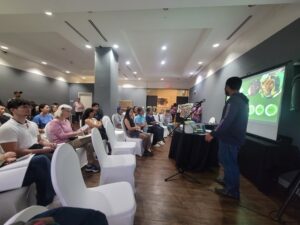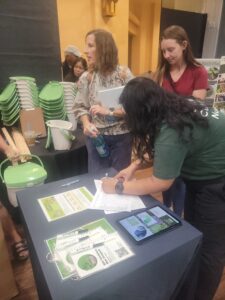Progress report for WPDP24-031
Project Information
The Hawaii Good Food Alliance (HGFA) and its partners, which include the Hawaii Department of Agriculture, UH CTAHR Extension, Guahan Sustainable Culture, Alaska Food Policy Council, and the Hawaii Agriculture Technical Assistance Hui (Ag TA Hui), propose a project to address the pressing need for sustainable agriculture in the USDA Regional Food Business Center (RFBC) Island and Remote Regions (Hawaii, Alaska, Guam, American Samoa, and CNMI).
The Target Areas share common challenges, including geographic isolation, complex food transit logistics, underdeveloped infrastructure, climate change impacts, colonial histories, indigenous populations, and legal issues. These challenges demand innovative solutions for building resilient and sustainable regional food systems.
To address these issues, our project leverages the 5-year RFBC Technical Assistance and Business Builder Grant programming to expedite the adoption of Western SARE sustainable agricultural practices. This project builds on planned RFBC events, workshops, training, and media products to disseminate Western SARE materials tailored to each region's specific needs.
By providing technical assistance and financial support through RFBC activities, this project equips agricultural professionals, producers, and communities with the knowledge and resources needed to reduce risks associated with sustainable practices. Through educational activities, workshops, training, and digital campaigns, the project empowers agricultural stakeholders to both adopt and share sustainable agriculture practices.
The project's outcomes will be rigorously evaluated, and results will be shared with the public to promote the adoption of sustainable agricultural practices and contribute to the region's environmental, social, and economic sustainability.
In summary, this project addresses the urgent need for sustainable agriculture and exemplifies the power of collaboration, education, and community
empowerment in driving positive change. It offers a holistic solution to the unique challenges faced by the Target Areas, paving the way for resilient, sustainable, and self-reliant local food systems.
UPDATE:
During the reporting period, the termination of the USDA Regional Food Business Center (RFBC) Island and Remote Areas program and broader shifts in the federal funding landscape significantly altered the scope and delivery mechanisms originally envisioned for this project. As a result, inter-regional travel, shared infrastructure development, and coordinated media and clearinghouse activities were paused or discontinued. In response, project partners adapted by prioritizing smaller, regionally grounded education and outreach activities that aligned with Western SARE goals and reflected local capacity and needs. Guåhan Sustainable Culture and the Alaska Food Policy Council delivered hands-on workshops, farmer trainings, and peer learning convenings focused on soil health, composting, sustainable production practices, and farmer leadership, while other partners underwent organizational restructuring and deferred activities. Moving into 2026, the project will continue to emphasize place-based, high-impact learning opportunities and relationship-driven collaboration, with a more localized approach to advancing sustainable agriculture in island and remote regions.
Enhance Understanding of Sustainable Agriculture Principles: Ensure that extension agents, technical assistance providers and agricultural professionals have a deep understanding of sustainable agriculture principles, with specific focus on soil health, integrated pest management, and ecological farming methods.
Expand Technical Proficiency: Strengthen the technical proficiency of agricultural professionals and producers in the application of sustainable agriculture techniques, such as organic farming practices, agroforestry, and precision agriculture.
Empower Decision-Making: Enhance the decision-making capabilities of agricultural professionals and producers by providing tools and knowledge for assessing the feasibility and potential benefits of sustainable practices.
Encourage Collaboration and Networking: Promote collaboration and networking among agricultural professionals and producers, enabling them to share best practices and learn from each other's experiences in sustainable agriculture.
Cultivate Leadership in Sustainable Agriculture: Identify and nurture emerging leaders in sustainable agriculture within the Target Areas, empowering them to take on leadership roles and inspire positive change in their communities.
Address Specific Regional Challenges: Tailor training and education to address the unique challenges faced by agricultural professionals and producers in the Target Areas, such as geographic isolation, climate change impacts, and limited resources.
Measure and Report Progress: Implement a system for measuring and reporting the progress of agricultural professionals and producers in adopting sustainable agriculture practices and principles.
Evaluate Impact: Conduct regular evaluations to assess the impact of the project in terms of the knowledge and skills gained by participants, as well as the subsequent adoption of sustainable practices in the Target Areas.
1: Project Kick-Off (August 2024)
Participants: Project Team, aka PT (HGFA, GSC, AFPC, UH CTAHR)
Expected Outcome (EO): Initiate project, define roles within each region of Target Area, and set clear objectives and timeline aligned with overall project objectives.
2: Collaborative Partnerships and Resource Alignment (October 2024)
Participants: PT, Partner Organizations
EO: Establish collaborative agreements and partnerships with relevant organizations.
3: Workshops and Training Sessions (November 2024 - October 2025)
Participants: PT, Partner Organizations, Extension Agents (EA)
EO: Commence the first round of workshops and training sessions, reaching approximately 75 participants in each region, for a total of 375 participants.
4: Information Clearinghouse Development (January 2025)
Participants: PT, Website Developer
Expected Outcome: Creation of a publicly available information clearinghouse webpage that contains essential, easily accessible, and easy to implement information on climate smart and sustainable agricultural practices.
5: Digital Media Campaign, Workshop Content and Products (November 2026)
Participants: PT, HGFA Interns
EO: Launch video series from content captured during Year 1 and 2 of workshops and training sessions to make sustainable agriculture education accessible to a wider audience.
6: Mid-Project Evaluation (December 2025)
Participants: PT, Evaluation Team, Partner Organizations
EO: Assess the effectiveness of education and outreach efforts and make necessary adjustments.
7: Year 2 Training and Workshops (November 2025 - October 2026)
Participants: PT, EA
EO: Conduct Year 2 training and workshop sessions, including lessons learned from previous year, and use opportunity to disseminate information on new resources developed (information clearinghouse and media products).
8: Evaluation and Impact Assessment (November 2026)
Participants: PT, Evaluation Team
EO: Evaluate the overall impact of the project on knowledge, skills, and the adoption of sustainable practices.
12: Project Closure (November 2026)
Participants: PT, Partner Organizations
EO: Conclude the project, assess achievements, and ensure knowledge sharing for continued efforts in the Target Areas.
Education
The project employs a regionally tailored, hands-on educational approach to enhance sustainable agriculture practices across diverse Pacific and Alaska communities. Through a series of targeted workshops, the program provides practical, place-based learning experiences designed to address the unique challenges and opportunities in each region.
Workshops in Guam, American Samoa, and CNMI, led by Guåhan Sustainable Culture, focus on soil health management in tropical ecosystems, aligning with regional conferences to maximize impact. In Alaska, the Alaska Food Policy Council facilitates workshops at key agricultural events, including the Southeast Alaska Farmers Summit, Alaska Food Policy Council Conference, and pre-apprenticeship farmer training programs, ensuring accessibility across urban and rural areas. Meanwhile, Oʻahu Resource Conservation & Development Council (Oʻahu RCD) delivers grant-readiness workshops to equip farmers and ranchers with essential funding and business planning skills.
By integrating technical training with culturally relevant and community-driven approaches, this project strengthens local agricultural knowledge, builds farmer capacity, and fosters resilient food systems across the Western Pacific and Alaska. In Year 1, the program aims to engage at least 40 farmers through these professional development opportunities.
Education & Outreach Initiatives
Enhance the knowledge, skills, and financial readiness of farmers, ranchers, and agricultural practitioners to implement sustainable agriculture practices, improve soil health, access funding opportunities, and strengthen local food systems.
To achieve this objective, the project delivers a series of workshops and training sessions across Guam, American Samoa, CNMI, and Alaska, tailored to each region's unique agricultural challenges and opportunities. Activities include:
- Guåhan Sustainable Culture – Conducting a soil health workshop in Guam (April 2025) aligned with the CIS Conference, focusing on soil health management in tropical ecosystems.
- Alaska Food Policy Council – Hosting four workshops across Alaska, covering topics such as sustainable farming practices (Kodiak, March 2025), pre-apprenticeship farmer training (Fairbanks, Summer 2025), and leadership development for Indigenous farmers (Kodiak, August 2025).
- Oʻahu Resource Conservation & Development Council – Organizing four workshops on grant readiness for farms, ranches, and agricultural practitioners, equipping them with the skills to secure funding and improve business sustainability.
These sessions integrate hands-on learning, peer-to-peer knowledge sharing, and expert guidance from regional agricultural professionals. The initiative aims to engage at least 40 farmers in its first year.
- Short-Term Outcomes:
- Increased farmer understanding of soil health, sustainable farming practices, and grant application processes.
- Improved access to technical knowledge and funding opportunities for small and beginning farmers.
- Strengthened peer-to-peer learning networks and collaboration among farmers across regions.
- Intermediate Outcomes:
- Adoption of sustainable soil and farm management practices based on training learnings.
- Increased number of successful grant applications submitted by farmers who attended grant readiness workshops.
- Expansion of professional networks between agricultural professionals and farmers, supporting long-term knowledge sharing and mentorship.
- Long-Term Outcomes:
- Increased farm productivity and sustainability in the Western Pacific and Alaska.
- Greater financial resilience among farmers through improved access to grants and funding.
- Strengthened regional food systems with enhanced capacity for sustainable agriculture, economic development, and climate adaptation.
Educational & Outreach Activities
Participation summary:
Learning Outcomes
Project Outcomes
Despite significant disruption caused by the termination of the USDA Regional Food Business Center (RFBC) Island and Remote Areas program, this project continued to generate meaningful learning and action outcomes by supporting regionally grounded, place-based education for farmers and agricultural practitioners in Guam, CNMI, and Alaska.
In Alaska, the AFFECT Farmer Training Program provided an intensive, 15-week cohort-based learning experience for beginning and early-stage farmers. Participants gained hands-on skills in soil health management, composting, mulching, season extension, orchard management, diversified vegetable production, and farm business planning. Thirteen farmers completed the program and reported increased confidence in applying sustainable farming practices appropriate to Interior Alaska’s climate and growing conditions.
The Southeast Alaska Farmers Summit convened 82 participants, including current and aspiring farmers, Alaska Native producers, and agricultural professionals. Through workshops, farmer roundtables, and peer-to-peer exchange, participants strengthened their knowledge of composting, biochar, seed saving, value-added products, cold storage, and climate-responsive farm planning. The summit emphasized relationship-building and regional collaboration, outcomes consistently identified by participants as critical to sustaining agriculture in geographically isolated regions.
In Guam, Guåhan Sustainable Culture delivered a Composting in Every Village workshop focused on food waste diversion and soil health. Participants learned practical composting techniques and were introduced to community-based composting systems that support household food waste reduction and local soil fertility. The workshop reinforced sustainable land stewardship principles while strengthening connections between community members, educators, and environmental partners.
Across regions, the project supported the adoption of sustainable practices by at least 24 farmers and contributed to the formation of new working collaborations among farmers, educators, and partner organizations. While the scope of activities was reduced following the loss of RFBC infrastructure and funding, the project demonstrated adaptive capacity by prioritizing high-impact, locally relevant education that continued to advance Western SARE goals under constrained conditions.
An unanticipated outcome of this project was the increased emphasis on smaller, more intentional learning environments following the loss of inter-regional travel and coordination capacity. Partners shifted toward localized, relationship-based education models that allowed for deeper engagement, hands-on learning, and sustained mentorship. These approaches proved particularly effective in remote and island contexts, where trust, place-based knowledge, and farmer-to-farmer learning are critical to long-term adoption of sustainable practices.
A beginning farmer from Interior Alaska who participated in the AFFECT Farmer Training Program reported increased confidence in managing soil fertility and compost systems on their farm. Through hands-on learning at multiple host farms, the farmer adopted mulching and composting practices that improved soil structure and reduced input costs during their first full growing season.
A Southeast Alaska producer attending the Farmers Summit described the value of learning from peers facing similar climate and infrastructure challenges, noting that connections made at the summit helped them explore new approaches to season extension and value-added production appropriate for their region.

